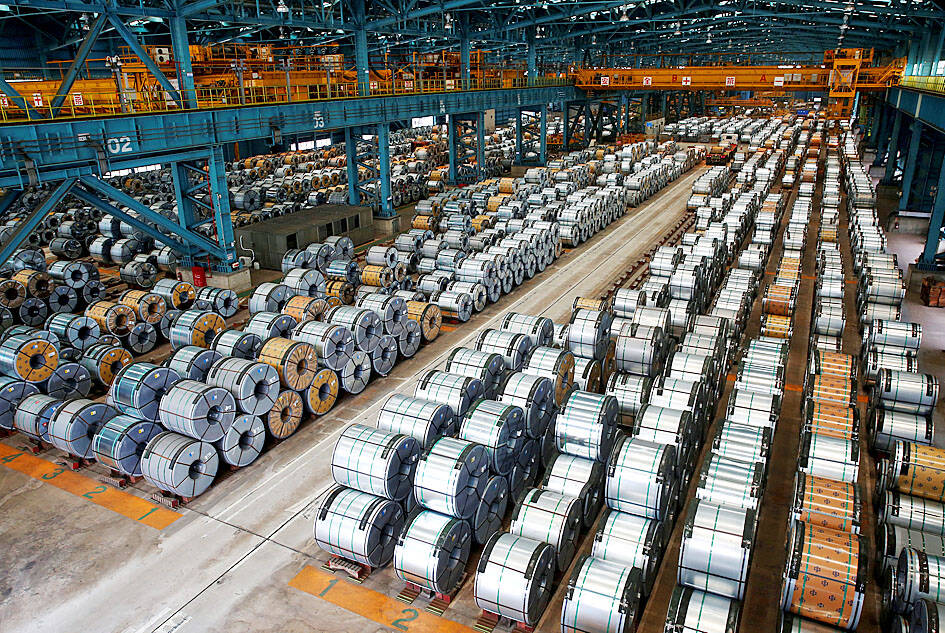China Steel Corp (中鋼) yesterday said it would raise domestic steel prices by up to NT$1,200 (US$39.59) per tonne for delivery next month, citing rising raw material costs and an upward trend in global markets.
The rising costs of iron ore and coking coal, along with robust post-COVID-19 pandemic demand in China, Europe and the US on the back of inventory replenishment, and Beijing tightening control on crude steel production, boosted market outlook for the second quarter, the nation’s only integrated steelmaker said in a statement.
China Steel said its price increases reflected price hikes by its international peers, including US-based Nucor Corp and Cleveland-Cliffs Inc, South Korea’s Hyundai Steel Co and China’s Baowu Steel Group Ltd (寶武鋼鐵).

Photo: Tyrone Siu, Reuters
China Steel’s price increases followed similar moves in December last year and last month. It at the time cited robust restocking demand for steel used in vehicles, home appliances and machinery.
The company’s latest adjustments are to increase prices of hot-rolled steel plates and hot-rolled carbon steel by NT$1,200 per tonne each, while the price of hot-rolled steel coils would rise by NT$900 per tonne, it said.
The price of cold-rolled steel coils would increase by NT$1,000 per tonne, the company said.
Prices of hot-dipped, zinc-galvanized steel coils used in construction and enameled steel would rise by NT$1,000 per tonne, while those used in home appliances and computers would increase by NT$600 per tonne, it said.
The price of electrical sheets would rise by NT$600 per tonne, it added.
Last week, the company reported that consolidated revenue last month decreased 15.26 percent month-on-month and dropped 34.43 percent year-on-year to NT$26.24 billion, saying it was due to the Lunar New Year holiday resulting in fewer working days in the month.
The company said revenue outlook for this quarter remains promising in light of robust inventory replenishment from customers and an uptrend in global steel prices.
The company said it expects market momentum to remain solid through next quarter, a traditional high season for the industry, citing a gradual recovery in the global economy and reconstruction demand after a devastating earthquake struck Turkey and Syria last week.
For the whole of last year, the steelmaker’s pretax profit reached NT$23.26 billion, down 72 percent from 2021, as revenue fell 4.01 percent to NT$449.57 billion, data released on Jan. 31 showed.

UNCERTAINTY: Innolux activated a stringent supply chain management mechanism, as it did during the COVID-19 pandemic, to ensure optimal inventory levels for customers Flat-panel display makers AUO Corp (友達) and Innolux Corp (群創) yesterday said that about 12 to 20 percent of their display business is at risk of potential US tariffs and that they would relocate production or shipment destinations to mitigate the levies’ effects. US tariffs would have a direct impact of US$200 million on AUO’s revenue, company chairman Paul Peng (彭雙浪) told reporters on the sidelines of the Touch Taiwan trade show in Taipei yesterday. That would make up about 12 percent of the company’s overall revenue. To cope with the tariff uncertainty, AUO plans to allocate its production to manufacturing facilities in

Taiwan will prioritize the development of silicon photonics by taking advantage of its strength in the semiconductor industry to build another shield to protect the local economy, National Development Council (NDC) Minister Paul Liu (劉鏡清) said yesterday. Speaking at a meeting of the legislature’s Economics Committee, Liu said Taiwan already has the artificial intelligence (AI) industry as a shield, after the semiconductor industry, to safeguard the country, and is looking at new unique fields to build more economic shields. While Taiwan will further strengthen its existing shields, over the longer term, the country is determined to focus on such potential segments as

TAKING STOCK: A Taiwanese cookware firm in Vietnam urged customers to assess inventory or place orders early so shipments can reach the US while tariffs are paused Taiwanese businesses in Vietnam are exploring alternatives after the White House imposed a 46 percent import duty on Vietnamese goods, following US President Donald Trump’s announcement of “reciprocal” tariffs on the US’ trading partners. Lo Shih-liang (羅世良), chairman of Brico Industry Co (裕茂工業), a Taiwanese company that manufactures cast iron cookware and stove components in Vietnam, said that more than 40 percent of his business was tied to the US market, describing the constant US policy shifts as an emotional roller coaster. “I work during the day and stay up all night watching the news. I’ve been following US news until 3am

COLLABORATION: Given Taiwan’s key position in global supply chains, the US firm is discussing strategies with local partners and clients to deal with global uncertainties Advanced Micro Devices Inc (AMD) yesterday said it is meeting with local ecosystem partners, including Taiwan Semiconductor Manufacturing Co (TSMC, 台積電), to discuss strategies, including long-term manufacturing, to navigate uncertainties such as US tariffs, as Taiwan occupies an important position in global supply chains. AMD chief executive officer Lisa Su (蘇姿丰) told reporters that Taiwan is an important part of the chip designer’s ecosystem and she is discussing with partners and customers in Taiwan to forge strong collaborations on different areas during this critical period. AMD has just become the first artificial-intelligence (AI) server chip customer of TSMC to utilize its advanced